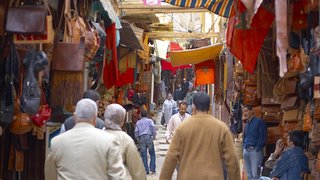
In this country you may encounter centuries old tongues of the Berber. The very same place may commonly use Morrocan Arabic as well, a form of Arabic sufficiently distinct from it's Middle Eastern brethren to render it indecipheral to an Egyptian. Then we add the liberal use of French, a consequence of protectorate rule in 1912, plus the influence of Spanish in the northern coastal areas. And finally there is the ever present demand for English - the glue of globalisation!
At first glance it seems improbable and impractical to sustain so many languages in a country of just 32 million people. This strikes me as the first miracle of language - it's ability to take on many forms and be distinctly effective.
And here lies the great beauty inherent to language... that each form taken not only meets a set of fundamental requirements, but each form offers an expression of things unique to that tongue. For example, there is no word or phrase in English which truly conveys the Tibetan word 'metabehavna'. Some people call it 'loving kindness' perhaps, but knowing that this fails to express the emotional and physical state that one embraces when practicing this meditation. Only the Tibetan original is simultaneously succint and generous. The word fully blooms in its untranslated form - a gift from the Tibetan language.
The second miracle is to observe individual people proficient in many tongues. This too is a thing of great beauty, and imense wonderment to a linguistics luddite such as myself. How astounding that the human mind can organise and exercise multiple frameworks for talking. Speech is so much more than just a bunch names for objects (I love that the word 'noun' is a name for words that name!).
Speech is the roadmap for our thoughts, reflections of our feelings, and hence the library for our experience. I wonder if our knowledge of vocabulary in some way determines our capacity to remember past events at the experiential level. If I didnt learn the word 'metabehavna' how would I reconnect with experience over and over, let alone discuss it with someone else. Surely the process of learning language redefines my very boundaries for experience. How can I comprehend that which cannot be 'named'? (apologies to Ekhart Tolle who's literature points out that on a higher level there comes a point at which language restricts the act of experiencing 'the moment').
What is characteristic of those fortunate people who are multi-linguistic is a broadening of the mind. They are often more lateral in thought, more flexible in learning, and more subtle in their understanding. I envy the elegance of mind that comes with such a talent.
For the most part I believe language to be a talent lay dormant in those of us confined to the Queen's English. The human brain is a wonderous device full of tricks to amaze in this regard. Even for the untrained such as I there exists a patch of blurry magic from which snippits of useful language emerge without warning. Without rehersal or precedent odd phrases will burst out of my mouth and temporarily bridge the communication gap. Have you never done this yourself and wondered 'how did i know that'? Nestled away deep down are entire phrases and the connotative associations to make them useful.
I am not sure which is more amazing to me. That language comes in such an array of effective forms or that we have the capacity to use them. I heard that Morocco would be a remarkable place to visit. No doubt a diversity of language goes hand in hand with a diverse culture.
No comments:
Post a Comment